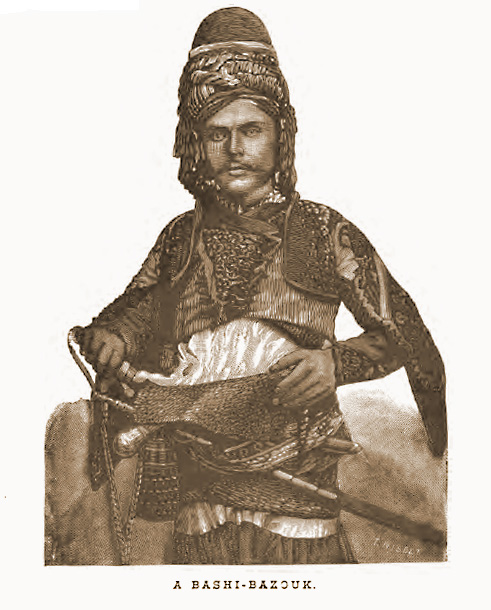One Sunday morning in 1879 [actually
November 1878] father left home very early in order to be in time for
the first church service. Nearing a square he was surprised to see
a crowd of armed men who told him to take his family and run to the
mountains, since a big force of "Bashi-bazouks" (irregular Turkish
soldiers) was approaching, killing everybody on their way.

Father
took my younger brother in his arms, mother held her three-week baby and
told me to follow, holding her skirt, and thus we started running toward
the mountains. Although the silence was almost complete, we saw many
people running, as we did, for their safety. I felt sleepy and
tired from the very beginning, stumbled and fell down, but was
immediately up again and running uphill as in a nightmare.
Thus we ran many hours, until finally we stopped at a place where
immediately I fell asleep to wake up only the next morning and see the
sun pouring through the trees on a miserable crowd of silent men, women
staring at nothing, and children whimpering for the hurts received from
stumbling and falling during their flight.
We stayed in the mountains for two days during which time the Turks had
sacked the town and killed many of those who had not succeeded in
escaping. Father lost all his movable property, but that was
easily forgotten since none of the family had lost his life. After
several months order was restored and life resumed its usual course for
most of the families.
The flight of the Stephanov family to safety must have been an
often-repeated family story. Katarina’s younger brother, Professor
Constantine Stephanove, mentioned it to the English journalist, John
MacDonald, and the Englishman included it in his dispatch printed in the
March 30, 1903 issue of the London Daily News:
One morning,
while we were strolling through the bazaar at Serres, Stephanoff
suddenly stood still before an inn gateway, into which a countryman was
leading his mules laden with merchandise of all sorts. They stared at
each other, the young man and the old. They grasped each other hands
affectionately, exchanged a few words and parted. It was Stephanoff's
uncle, from Bansko. After ten years they scarcely recognized each other.
With the Zaptiehs about, they did not venture to be more demonstrative.
"In 1879," said Stephanoff, "when I was three years old, and when my
father and mother and the rest of us, fearing a massacre in Bansko, fled
to Philippopolis, it was my uncle who carried me on his back across the
mountains. The scar on his lip was made by the knife of one of three
Bashi-Bazouks who attempted to rob him and a small company of his
fellow-traders returning home from market." So it still is the same
Macedonia--only twenty-four years nearer its end.